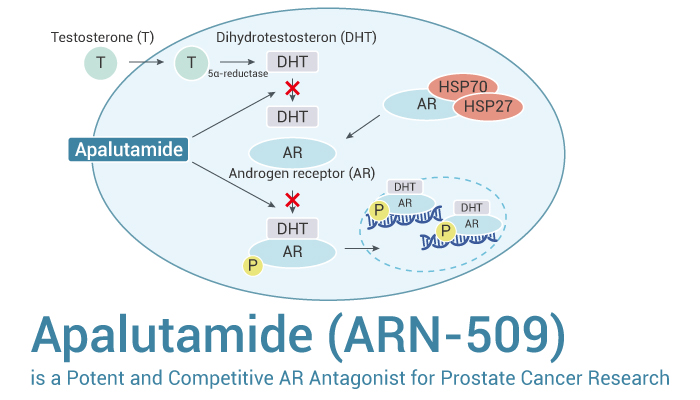Among numerous cancers, prostate cancer is one of the most common cancers in men. Androgens and androgen receptors (AR) play an essential regulatory role in prostate cancer progression. For this reason, the androgen receptor is a significant therapeutic target for prostate cancer. However, prostate cancer metastasizes more easily when testosterone is blocked with androgen-suppressing hormone therapy. Therefore, many studies are being conducted on anticancer therapies using flavonoids and natural bioactive compounds. Against prostate cancer, cancer cell death through apoptosis, especially anticancer action using natural bioactive compounds, such as flavonoids, has played an important role. Today, we will introduce a flavone — Apalutamide.
Apalutamide (ARN-509) is a potent and competitive AR antagonist, binding AR with an IC50 of 16 nM.
First, Apalutamide (ARN-509) is a potent AR antagonist that targets the AR ligand-binding domain and prevents AR nuclear translocation, DNA binding, and transcription of AR gene targets. Second, Apalutamide also exhibits low micromolar affinity (IC50 = 3 μM) for the GABAA receptor in radioligand binding-assays and thus may potentially antagonize GABAA at therapeutic dose levels.
In vivo, Apalutamide exhibits low systemic clearance, high oral bioavailability and long plasma half-life in both mouse and dog, supporting once-daily oral dosing. Meanwhile, consistent with its long terminal-half-life, Apalutamide steady-state plasma-levels increases in repeat-dose studies, resulting in high C24hr levels and low peak:trough ratios (ratio: 2.5). Furthermore, Apalutamide (30 mg/kg/day) shows 13 of 20 animals exhibited >50% reduction in tumor-volume at day 28.
In a word, Apalutamide is a potent and competitive AR antagonist and can be used for prostate cancer research.
Reference:
[1] Clegg NJ, et al. Cancer Res. 2012 Mar 15;72(6):1494-503.
[2] Jeong SH, et al. Int J Mol Sci. 2023 May 25;24(11):9240.
